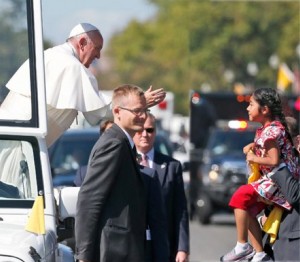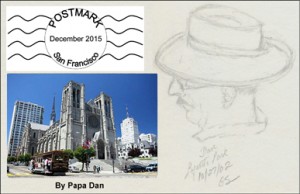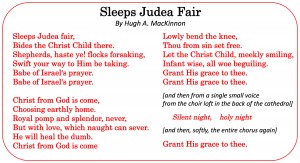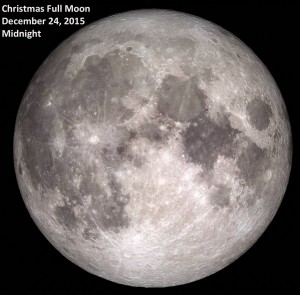Grace
I do not understand the mystery of grace
— only that it meets us where we are
but does not leave us where it found us.”
— Ann Lamott
Seeking Harmony in a Tradition of Grace
On Saturday, December 12, Gretta and I continued our nineteen-year tradition by attending “A Cathedral Christmas.” It is an annual Christmas concert of the Men’s and Boy’s Chorus, orchestra, and pipe organ, at Grace Cathedral in San Francisco.
For us, the tradition is in the music — for the music is truly magnificent. Usually, the concert focuses on two principal themes:
1) the joy associated with the birth of The Child — represented by well-known Christmas carols in the first and third segments of the performance — and
2) the peacefulness settling over the ‘Holy Land’ and the world, associated with the hope for peace that The Child would bring – represented by classic choral and orchestral music performed with sweetness and passion in the concert’s middle segment.
The signature piece of the Grace Cathedral Music Ministry has always been a tune called “Sleeps Judea Fair,” by Hugh MacKinnon. Gretta and I always look forward to this tune, in the middle segment of the concert, as the highlight of the season. The lyrics and the slow, soft harmony of the voices recreate the joy and peace associated with the season.
Settling into our usual seats on the aisle of Row S, at the acoustic center of the cathedral — one of America’s premier acoustical rooms — the stained-glass figures of the saints all around the cathedral, contributed to the warmth, peace, and harmony that we, and they expected. I opened the printed program to read the list of musical pieces. I had to study it several times before I realized that “Sleeps Judea Fair” was NOT listed.
It was NOT listed!
“What’s that about?!” I said out loud. As the choir emerged to begin the concert, I said to Gretta, “I’m surprised just how distressed I feel that it’s missing.”
“Me, too” she said.
The first segment of the concert contained the familiar choral pieces we had come to expect – like John Rutter’s The Holly and the Ivy — and others we all recognize. When the Men’s and Boys’ chorus left the altar for an intermission, a lively string quartet created a clever medley of carols interspersed within Bach’s Brandenberg Concerto #3.
Then, after applause for the quartet, the singers and the organist returned for the middle portion of the program, the segment that traditionally conveys the message of peace and serenity culminating in their signature piece, “Sleeps Judea Fair.” But, since that piece was not listed in the program, we weren’t sure what to expect.
What followed was a shock. The three pieces in this segment featured, from beginning to end, harsh spasmodic cascades of unresolved dissonance, typical of the more unsettling 20th century compositions. The last of these, clearly difficult to perform, included a few moments that sounded like small eruptions of harmony attempting to make themselves heard above the all-encompassing harshness, only to be musically shouted down and drowned out by the grating dissonance, ending without resolution. The faces of the saints in the stained-glass windows seemed to show the strain, their colors pale in the fading light. Then, in the final segment, the sing-along tunes like “Hark, the Herald Angels Sing” completed the program, as always. As Gretta and I attempted to sing along after the jarring experience of the middle segment, I realized what they had done. I said to Gretta, “I get it.”
It was a harsh message: there is no peace and harmony this Christmas season — not in the city, not in America, not across the world, and certainly not in Judea and the countries that surround it in the Middle East. The choir could not sing their signature piece, “Sleeps Judea Fair,” because the message would have been a false one.
I get it. I don’t like it, but I get it. We are being instructed to look harder for peace and harmony — and, finding none, create some ourselves.
Looking for Moments of Grace in a Grim Year
As we walked out of the cathedral on that beautiful December evening, humanity being what it is, our world remained a place of suffering and danger. I certainly didn’t have to look far to find many sources of harshness and struggle.
- Suffering and terror emanate from in the Middle East (yes, even ancient Judea) and have spread across the world in the form of war and poverty.
- The US continues to be plagued by gunfire — gunfire enabled by American leaders, local and national, determined to keep as many guns in the hands of as many people as possible.
- Our “tough-guy” politics is demonstrating its penchant for keeping us fearful and divided and promises to get louder and cruder in the heat of a presidential race.
- While unemployment has declined, under-employment and low wages are increasing across a shrinking middle class in America.
- Individuals with dark skin or who speak with foreign accents or in foreign languages are made to feel increasingly unwelcome or, worse, in danger in their own neighborhoods.
- In our cities, an increasing number of homeless individuals and families, who have dropped out of the middle class, are no longer looking for work, just struggling to find help — some sitting on street corners here on Nob Hill hoping for a few bills dropped in their basket by people emerging from expensive holiday concerts.
Looking around at all of this, we can find plenty of reasons to be discouraged. But Americans have often defied logic and looked around for moments of grace during hard times.
Looking at the sky on Christmas Eve, while some were hoping for a glimpse of Santa Claus, a rare Christmas full moon provided me with moments of willful optimism. I asked myself, “Can I look up at the brightness, tune out the rancor, and find reasons to believe in humanity’s better attributes: humility, conciliation, kindness, dignity, reason?
But, you know, if we look, there are hopeful signs everywhere, right down here on the surface:
- World leaders met in Paris this past month to reach an agreement that may yet stop our steady march toward an uninhabitable planet. The agreement offers our “last best hope” for meaningful global action to avert catastrophic climate change; and 195 countries promised to grab it. Can we succeed with so many industrial-strength forces working against us?
Can we?
- Pope Francis, naming himself after an Italian saint with a message of humility and peace, chose to visit the Americas and shine a mass-media spotlight on that message. He challenged the wealthy and powerful (including Congress) in the name of the poor and the weak.

He prayed at ground zero and hugged a little girl who jumped a fence to approach his motorcade in Washington. Francis set a very public example of welcome for children, immigrants, the forgotten — asking us to follow.
Can we?
- Tens of thousands of refugees who fled their homes to escape the catastrophe in Syria found open doors and hearts in Germany and elsewhere. The response from some other nations continues to be fearful and inadequate, but the Germans sent a message to all of us that rebukes nationalist bigotry, defends human rights, and reminds countries like the US how to confront a humanitarian emergency. How long can they sustain it? In our own neighborhood, Canada has begun to follow the German example and may be teaching us how to respond as fellow humans. Is the challenge too big? Can we care for others on such a large scale?
Can we?
- This year, the US Supreme Court affirmed the marriage rights of same-sex couples who had been denied equal treatment under the law. Can our society accept them?
Can we?
- A bipartisan movement for criminal justice reform advanced in small steps, despite our ugly politics, asking “Can we find alternatives to mass incarceration and reduce the forces that sent so many Americans to prison?”
Can we?
- In neighborhoods long scarred by discrimination and police brutality, the Black Lives Matter movement spread a message of peaceable resistance. It is the method of that resistance that offers hope. Those small moments of progress are encouraging a similar struggle for a living wage for the lowest-paid workers in our prosperous land in a campaign for a $15 minimum wage. Small successes are emerging. Can we broaden those efforts across our workforce?
Can we?
- Dozens of states and cities, resisting vocal opposition, passed laws expanding rights and inclusion for undocumented immigrants, through driver’s licenses, legal services, and health care. Here in January, California has become the first state to forbid discrimination based on immigration status, language, or citizenship. Can we expand these moments of progress?
Can we?
In addition to these more visible, public efforts, some individuals led by example, opposing hatred and fear with compassion and courage in their own neighborhoods.
- Some Parisians opened their homes to strangers on the night of terrifying slaughter there.
- After a gunman’s rampage at an African Methodist Episcopal Church in Charleston, S.C., victims’ families publicly forgave the killer. The mayor said “A hateful person came to this community with some crazy idea he’d be able to divide us, but all he did was unite us and make us love each other even more.” President Obama sang a song (not among his core skills) at that South Carolina church — Amazing Grace. The congregation stood up and joined him and, a few days later, the Confederate battle flag came down at the South Carolina State Capitol. It was a symbol of a distinct piece of our American character that we cannot deny. Can we bring down more than just the symbols?
Can we?
Evil is everywhere; and anger and hatred are loud. The shouting and the dissonance can drown out the quiet voices and the moments of harmony, even in Grace Cathedral. Tragedy and disaster can block our view of goodness. Yes, it can. And yet, there are signs of progress toward a better future. We need to look carefully for those signs, or we may miss them. Better yet, can we create more of those signs of progress for others to see?
Can We?
After seven years, I haven’t forgotten the words, “Yes, we can.”
But, as I look at the state of the nation and the world here at the start of 2016, it is clear that the “We” in that optimistic phrase has not been enough. Could it be that the era of reliance on “We” is coming to an end? Perhaps it must begin with “Yes, I can.”
Can I?
What can I do, as an individual, to make a difference? Since “grace” does not seem to be emerging from the “We” of national and international institutions, I suppose it is going to have to begin with me.
But How? I suppose there are lots of options. What do I need to do?
Maybe I can start by contributing to organizations that do the work I can’t do on my own — some of our favorites: Planned Parenthood, Reach Out and Read, Boys and Girls Clubs, Sierra Club, Yosemite Conservancy, Valley Humane Society, American Civil Liberties Union, KQED, The Kidney Foundation, Hillary for America. All are hopeful efforts.
It’s not enough; but it’s a start.
Download a PDF of this post: Grace_Dec15_ConVivio_Jan9_2016_v2



Dan, thanks so much for this thoughtful essay. Yes, there are terrible things going on in the world. But there are many wonderful things too. Sometimes they make the news, like the inspiring events you mention. (I have been filled with awe and inspiration, by the welcome that the Germans, Swedes, Canadians and others have extended to the refugees.)
More often the wonderful examples of good don’t make the news. They are simply part of the quiet ebb and flow of human kindness, as ubiquitous and natural as as the warmth of the sun on a cold, clear day, shining on all who step out of the shadows. They are real, and numerous. We have to acknowledge and celebrate those, try to give them as much attention as that which the terrible things demand of us. Otherwise, we are mesmerized into thinking that evil is all there is.
By the way, your concert so reminded me of a concert that has become our favorite, and a tradition in our new lives here in the NW. It’s called, “A Light in the Darkness: Songs of Hope and Comfort,” presented by the choral group and splendid student soloists from Western Washington University, held in beautiful St. Paul’s Episcopal church (great acoustics). This concert is held in late November, before Thanksgiving, just as we are all starting our various traditions of celebrating the holiday season. The choral selections are interspersed with readings of short poems, and preceded by a glorious organ concert (J.S. Bach). The music and poems are spiritual, but not religious. The concert is a celebration of the onset of winter, of the cold and dark, and of the way we can draw together in to be warm and safe and to share what we have that is good.
For example, the evening opened with one of the student actors reading this Rumi poem:
“Wonderer, worshipper, lover of leaving.
It doesn’t matter.
Ours is not a caravan of despair.
Come, even if you have broken your vow a thousand times.
Come, yet again, come, come. ”
One of the songs, by J.A.C Redford:
“Let beauty be our memorial;
let love be our last, best word;
let our dissonant counterpoint finally resolve
in a graceful, consonant chord.
Let goodness hallow the holy ground
where under the Mercy we rest;
let beauty be our memorial
and let all the earth be blest.”
The last song was the beautiful piece, “The Road Home.” (It’s worth finding this on YouTube, it’s so beautiful.) With our thoughts on refugees desperate to find a new home, this was very affecting.
“Tell me where is the road I can call my own,
that I left, that I lost, so long ago?
All these years I have wandered,
oh when will I know there’s a way,
there’s a road, that will lead me home?
After wind, after rain,when the dark is done,
as I wake from a dream in the gold of day,
through the air there’s a calling from far away,
there’s a voice I can hear that will lead me home.
Rise up, follow me, come away is the call,
with the love in your heart as the only song;
there is no such beauty as where you belong;
rise up, follow me, I will lead you home.”
And the program ended with this poem by Hafiz, A Great Need:
“Out of a great need
we are all holding hands
and climbing.
Not loving is a letting go.
Listen, the terrain around here
is far too dangerous
for that.”
You can see, it means a lot to us — I keep the programs. We always leave with hearts filled up, feeling purged of thoughts that are small and mean. Walking into the cold night air feels like a blessing. Such a lovely experience.
Thanks for the reminding me of it!
Megan, Thank you for your reply — and for reading. Your song is beautiful. In case others would like to hear it, here is the youtube link:
https://www.youtube.com/watch?v=_psh07euTno
I have enjoyed your essay. It has given me moment to pause and question myself about what I can and must do. I don’t have an answer for you right now, but I will in the near future. We are so blessed with what we have that we tend to take it for granted, that somehow we have done something to deserve it more than those that don’t have it. All any of us have done is survive birth. Where and to whom we are born to is luck of the draw and does not make any of us better than anyone else. Mankind does not like learning that lesson. If it did, you would not have been inspired to write your essay.